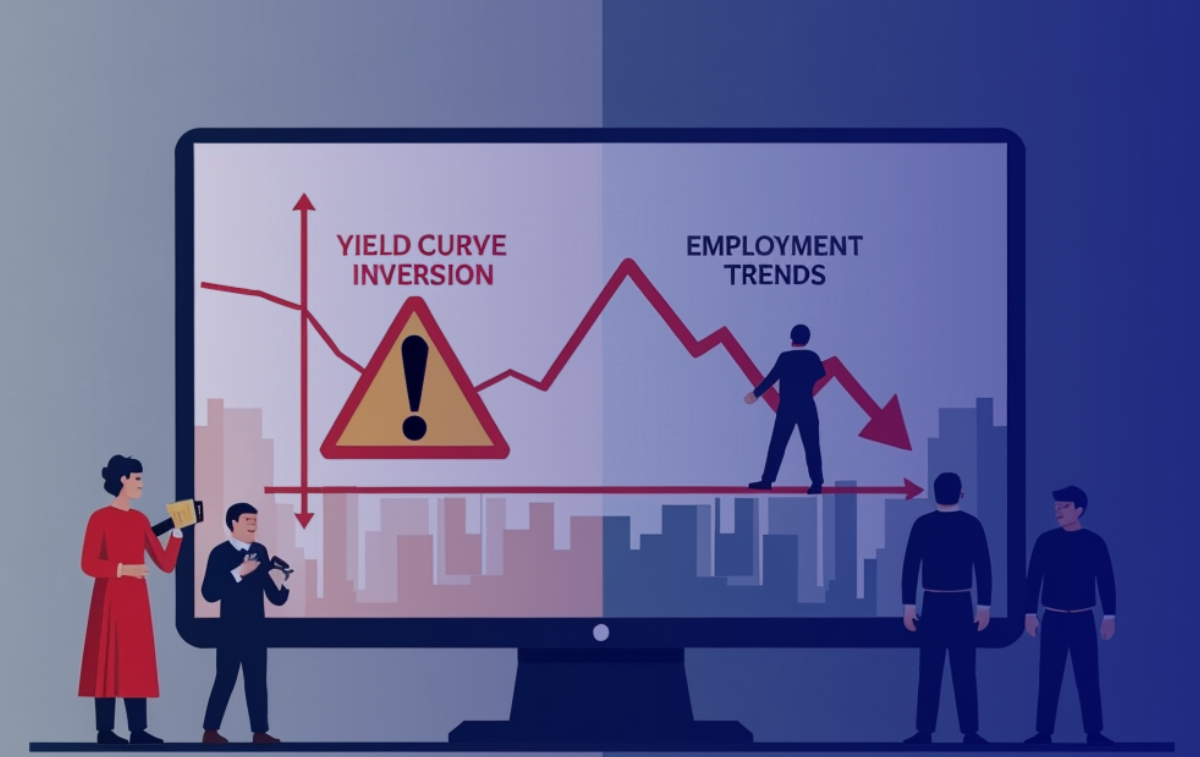JACKSONVILLE, FL – The yield curve inversion is often seen as a reliable predictor of economic recessions, with a history of signaling downturns approximately 6 months to 2 years before they occur. However, its reliability is sometimes overstated, as a recession does not always immediately follow an inversion, although a recession has never occurred without one. As we reach the two-year mark since the yield curve inverted in July 2022, it’s crucial to understand how this indicator interacts with other economic metrics, particularly full-time employment growth. This analysis explores these relationships and what they mean for the economy’s future.
This analysis focuses on two key economic indicators: the yield curve inversion, specifically the spread between the 2-year and 10-year Treasury yields, and year-over-year (YoY) changes in full-time employment. We sourced data from the Federal Reserve and examined historical patterns to understand how these indicators interact, particularly around recessions. The analysis highlights that while the yield curve inversion often precedes recessions, they typically do not begin until the curve normalizes, i.e., when the 2-year yield drops below the 10-year yield. Additionally, the analysis incorporates YoY changes in full-time employment as an important, yet less-discussed, predictor of recessions.
Correlation Analysis
Historically, every recession since 1980 has been preceded by a yield curve inversion. The analysis shows that as the yield curve begins to normalize, full-time employment typically starts to decline on a YoY basis, setting the stage for a recession. The correlation between these two indicators is visually evident when plotted against recessionary periods. For example, the 2007-2009 Great Recession followed nearly a year after the yield curve normalized and full-time employment began to fall.
Currently, full-time employment has already turned negative YoY, while the yield curve remains inverted. This scenario is unique, as it suggests that the economy may be on the brink of a recession, even before the yield curve has fully normalized. The typical pattern of a recession beginning when the yield curve is around a positive 50 basis points spread between the 2-year and 10-year yields may still hold, but the current economic environment introduces new uncertainties.
Weak Leading Indicators
The combination of these indicators—yield curve inversion and declining full-time employment—provides a more nuanced picture of the economic outlook. The yield curve’s inability to normalize, coupled with declining employment, suggests that the economy is in a precarious position. Historically, this combination has been a precursor to recessions, but the exact timing can be unpredictable.
For investors and policymakers, this means that relying on the yield curve alone may not provide a complete picture. The current situation, where employment declines have occurred before the yield curve normalization, could indicate either a delayed recession or a shift in the typical economic patterns we’ve observed in the past.
Conclusion
The interaction between yield curve inversion and full-time employment trends offers critical insights into the timing and likelihood of future recessions. While the yield curve has been a reliable indicator in the past, the current economic environment presents new challenges and uncertainties. As we continue to monitor these indicators, it’s essential to consider a broader range of economic factors to better anticipate potential downturns.
For a more in-depth analysis and to explore the detailed data and methodology behind these findings, read the full article here.
About Nuvo Capital Partners
Nuvo Capital Partners is a niche market-focused multifamily private equity firm operating throughout the Southeastern United States. As a dedicated sponsor (General Partner), we specialize in institutional quality real estate investments within these regions. Our team, with a combined 25+ years of experience, has facilitated over $700M in transactions (10,000+ units). Delivering a transparent investment process, we provide our investors with access to high-quality real estate opportunities, while also ensuring integrity throughout. Our commitment extends to providing monthly, quarterly, and yearly in-depth reporting for our valued investors. To learn more, visit nuvocapitalpartners.com.
If you are interested in learning more about Nuvo Capital Partners and the investment opportunities we are currently exploring, please feel free to contact us here.


Leave A Comment